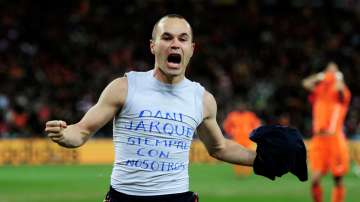Spanish football legend Andres Iniesta revealed that he was struggling with depression after winning the Champions League with Barcelona in 2009 and a few months before winning the FIFA World Cup with Spain.
In a Rakuten TV documentary, ‘Andres Iniesta - The Unexpected Hero', which was released on Thursday and covers his move to Japanese side Vissel Kobe in 2018, the 35-year-old spoke about the mental struggles that came with suffering an injury during the 2009 Champions League and the death of his close friend Daniel Jarque.
Jarque was the captain of the Barcelona-based Espanyol side before his death by heart attack at the age of 26. Iniesta was of the same age then. "The days pass and you realise you're not improving, you don't feel good, you're not yourself. Everything clouds over and goes dark," Iniesta says in the documentary.
Iniesta said that Jarcque's death "was like a body blow, something powerful that knocked me down again and I was pretty low, clearly because I wasn't very well."
Maria Lujan said that there was one night when he asked if he could sleep with her. "I noticed he wasn't well one night when we were sleeping downstairs and he came down and said, ‘mum can I sleep here with you?'" Maria said. "Then the world came down on my head."
Iniesta's father admitted that he felt his son may need to take a break from the game. His psychologist Inma Puig said that his recovery owed much to those around him, including then Barcelona manager Pep Guardiola.
"Guardiola said this is the first time I've been in this situation as a coach," said Puig. "I remember he said, ‘the most important thing now is Andres, the person not the player'."
"They're people and this is a very human thing which affects millions of people around the world," said Guardiola. "They have to know we are there for them."
"Guardiola tried to get him out of that bottomless pit he was in," said Iniesta's mother Maria.
Although he did not start most matches for Barcelona in the 2009/10 season due to his injuries and mental struggle, he was an integral part of the Spanish team that would later win the World Cup, famously scoring the winning goal against Netherlands in the final.
He would go on to play nearly 450 matches for Barcelona before leaving as club captain, passing on the armband to Lionel Messi.

